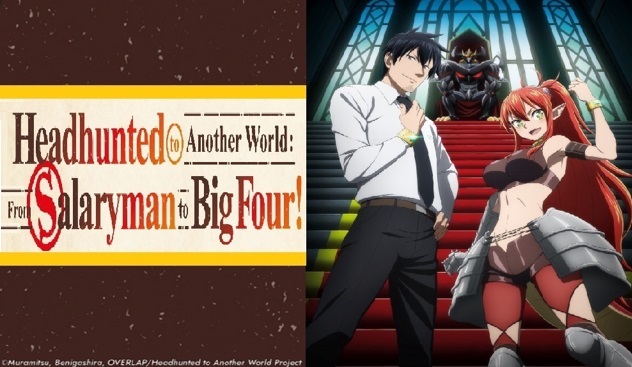English Dub Season Review: Headhunted to Another World: From Salaryman to Big Four! Season One
Based on the currently ongoing Japanese manga series written by Benigashira and illustrated by Muramitsu, the story takes place in an alternate fantasy world, where a powerful Demon King reigns with a formidable army led by his Four Heavenly Kings. One happens to be Denosuke Uchimura, a normal Japanese salaryman unexpectedly plucked from his mundane life by the Demon King himself. But even in this new realm, Uchimura is bestowed no particular powers. Can he survive treacherous missions with only the knowledge of an office worker?
On the technical side, this anime adaptation was produced by Geek Toys and CompTown and directed by Michio Fukuda, with Hiroko Fukuda handling series composition, Seung-Deok Kim serving as assistant director, Ayumi Nishibata designing the characters, and Takafumi Wada composing the music. The opening theme song is “Alternate World Concerto”, performed by Kentarō Seino, while the ending theme song is “Strong Girlfriend”, performed by Otonari.
This anime disguises itself as an isekai but is, at its core, an economic drama with a strong focus on business management. Rather than following the usual trope of an overpowered protagonist gaining supernatural abilities, it presents a grounded take on isekai by centering its story around corporate strategies, negotiations, and diplomacy. The protagonist, a salaryman, is summoned not for combat but for his expertise in handling business affairs, making this series feel more like “Business Studies: The Anime” rather than a typical fantasy adventure. Each episode explores various aspects of business, from striking deals to managing unexpected crises, often mirroring real-world corporate challenges in a medieval fantasy setting.
What sets Uchimura apart is his complete lack of cheat abilities. Unlike other isekai heroes who gain instant power or divine blessings, or whatever. He relies solely on his knowledge of company management, which, in this world, appears revolutionary. His role in the Demon Lord’s army isn’t that of a warrior but of a strategist tasked with uniting various races under a common goal. While this approach makes the story unique, it also leads to a rather restrained power fantasy. Instead of action-packed sequences, the focus is on behind-the-scenes maneuvering, where much of the actual negotiation and problem-solving happens off-screen. This can sometimes make the show feel like it’s skipping over its most compelling moments, leaving only the aftermath and the protagonist’s recognition in the spotlight.
The world-building and economic concepts explored in the series add an intellectual depth not often seen in isekai. Cultural differences, trade policies, and political strategies play a key role in shaping the narrative. There are moments where the anime delves into the nuances of communication, illustrating how minor misunderstandings can lead to business failures or diplomatic tensions. However, the way these ideas are presented can feel more like a lecture than a naturally unfolding story. Adding to this, the protagonist’s frequent visits to his “mind palace,” depicted as an sushi-bar, offer an odd stylistic choice—while meant to represent his thought process, it often results in predictable solutions rather than truly engaging problem-solving.
Visually, the animation quality is decent but nothing exceptional. While cost-cutting measures are noticeable at times, they don’t significantly detract from the overall experience. Character designs are serviceable, though there’s an overabundance of female characters who seem overly drawn to Uchimura without much justification. The opening theme attempts to evoke a sense of determination and progress, but the vocal balance makes it feel oddly subdued. The ending theme is somewhat catchy but ultimately forgettable, failing to leave a lasting impression.
Overall, the anime presents an interesting premise, but its execution may not appeal to everyone. While the blend of fantasy and corporate strategy is a refreshing take, the choice to keep the most intricate parts of the negotiation off-screen detracts from its potential depth. For those who enjoy isekai with a unique twist or have an interest in business mechanics, this could be an enjoyable watch. However, if you’re looking for high-stakes drama or dynamic storytelling, this series might feel underwhelming. It’s an intriguing concept that doesn’t fully capitalize on its strengths, making it a show that will strongly resonate with a niche audience but may leave others feeling un-engaged. If Season 2 ever becomes a thing, I’d be willing to see how far they’ll take it.














"There are also other characters that come and go (also owned by the Warner Bros. Discovery conglomerate media company)."
Huh. Is that just referring to other characters from the show itself, or is this implying that the new season is going to have cameos from other WBD IPs